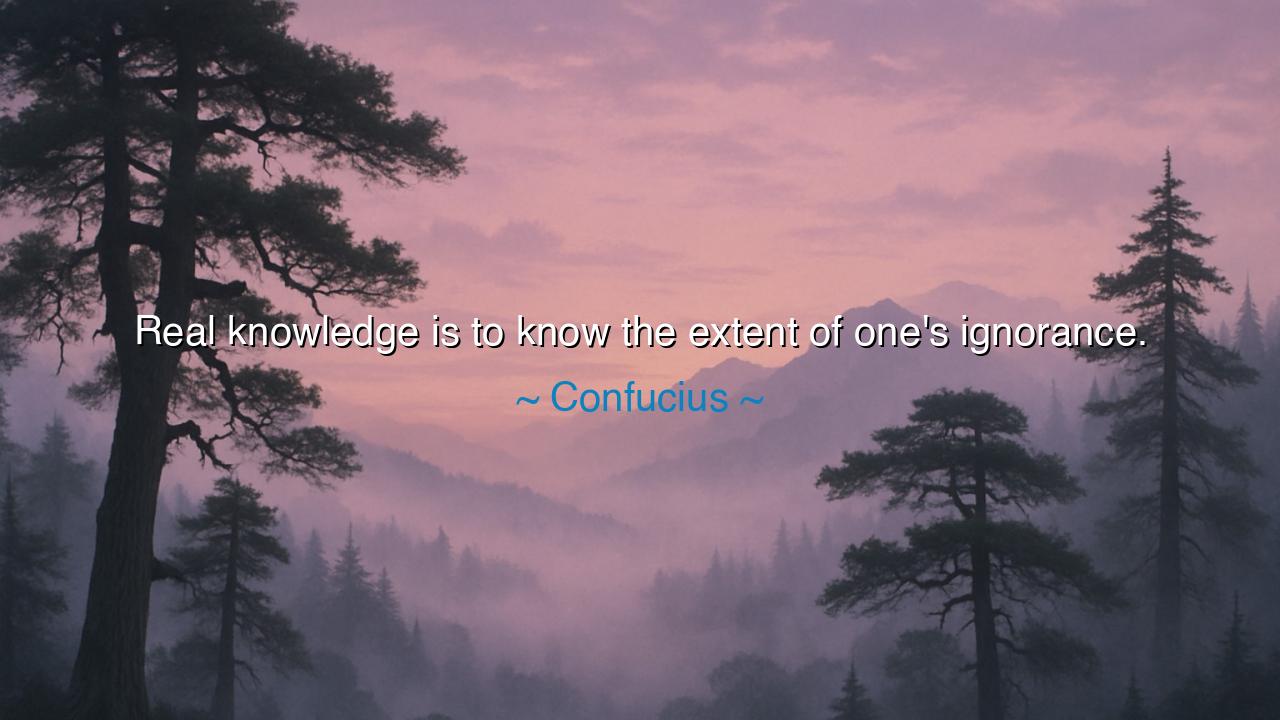
Real knowledge is to know the extent of one's ignorance.






“Real knowledge is to know the extent of one's ignorance.” — Confucius
Listen well, O seeker of truth, for in these words of Confucius, the sage of ancient China, lies a wisdom as deep as the roots of the earth itself. When he spoke these words, he was not diminishing knowledge, but exalting humility. For real knowledge is not the pride of knowing many things, but the wisdom of knowing how little one truly knows. The ignorant man believes his understanding complete, but the wise man trembles before the infinite — aware that his learning, though vast, is but a single drop in the ocean of truth. Thus, Confucius teaches that the beginning of wisdom is not mastery, but awareness — the honest acknowledgment of one’s own ignorance.
The origin of this saying rises from the heart of the Analects, where Confucius taught his disciples that learning is a lifelong journey. He lived in a time of turmoil, when lords fought for power and scholars sought favor through clever words. Yet the Master reminded them that the proud learner is like a sealed cup — nothing more can enter. Only the humble mind, open and self-aware, can continue to grow. His words echo the eternal law of wisdom: those who think they know all have ceased to learn; those who know their ignorance are forever students of the truth.
To know the extent of one’s ignorance is to stand before the vastness of creation and admit, “I do not yet understand.” It is to look upon the stars, the mysteries of life, and the hearts of men, and feel awe rather than arrogance. The wise man does not mistake knowledge for possession, nor truth for pride. He knows that every answer births new questions, that every discovery opens new mysteries. The fool seeks certainty; the sage seeks understanding. And in that humility lies his strength, for it keeps him ever alert, ever curious, ever alive to learning.
Consider the story of Socrates, the philosopher of Athens, who, like Confucius, drank deeply from the well of wisdom. When told by the oracle of Delphi that he was the wisest of men, Socrates laughed and said, “If I am wise, it is because I know that I know nothing.” In his humility, he revealed the same truth Confucius spoke: that wisdom begins where arrogance ends. When Socrates questioned the learned men of his city — the poets, the craftsmen, the politicians — he found that all believed themselves wise, yet none could see the limits of their knowledge. Thus, through confession of ignorance, he became the wisest of them all.
For ignorance itself is not the enemy — it is blindness to it that darkens the soul. The one who admits he does not know has opened his eyes; the one who insists he already knows has shut them forever. True knowledge, then, is born not from pride, but from humility; not from boasting, but from wonder. To know one’s ignorance is to remain teachable, adaptable, and wise — to live in harmony with truth rather than in opposition to it. It is the foundation of science, the root of philosophy, and the heart of virtue.
The lesson is this: never let learning lead you to arrogance. Let every new understanding awaken gratitude, not pride. When you are praised for wisdom, remind yourself that there is still more to learn. Seek teachers in all things — in books and in nature, in success and in failure, in friend and in foe. Approach every day as a student, not as a master, and your mind will never grow old. The moment you say, “I know enough,” you have already begun to die; but the moment you say, “I still have much to learn,” you have been reborn into the endless journey of discovery.
So remember, O traveler on the path of knowledge, that Confucius’s wisdom is a lantern for all ages. Real knowledge does not shout, it listens. It does not close its heart, it questions. It does not cling to certainty, it embraces mystery. The humble mind is vast because it does not confine itself; the arrogant mind is small because it believes itself full. Therefore, let your learning be a river that flows, not a pond that stagnates. Know that the more you learn, the more there is yet to know — and in that endless unfolding lies the beauty of the human spirit.
For he who truly knows himself — his ignorance, his limits, his longing — has taken the first step toward wisdom eternal. And that, my child, is the beginning of all real knowledge.






AAdministratorAdministrator
Welcome, honored guests. Please leave a comment, we will respond soon